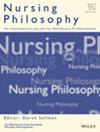通过扩大有色人种护士的贡献,使护理史非殖民化。
IF 2.6
3区 医学
Q1 NURSING
引用次数: 0
摘要
在本文中,我写了有色人种护士,他们对护理做出了重大贡献,但在与殖民思维相关的传统护理教科书中却被积极忽视。这样做的一个后果是,当我们考虑比较过去和现在的差异时,我们发现我们并没有带来太大的不同。差距仍然很大。我呼吁我们所有的护士挑战自己,跳出被殖民的思维框框,思考我们所知道的真相。本文章由计算机程序翻译,如有差异,请以英文原文为准。
Decolonize the history of nursing by magnifying the contributions of nurses of colour.
In this paper, I write about nurses of colour who have made significant contributions to nursing, yet are actively ignored in traditional nursing textbooks related to colonized thinking. One consequence of this is that when we think about comparing the disparities of the past to the present day, we see that we have not made much of a difference. The disparity is still huge. I call on all of us as nurses to challenge ourselves to think beyond the box of colonized thought to what we know is true.
求助全文
通过发布文献求助,成功后即可免费获取论文全文。
去求助
来源期刊

Nursing Philosophy
NURSING-
CiteScore
4.80
自引率
9.10%
发文量
39
审稿时长
>12 weeks
期刊介绍:
Nursing Philosophy provides a forum for discussion of philosophical issues in nursing. These focus on questions relating to the nature of nursing and to the phenomena of key relevance to it. For example, any understanding of what nursing is presupposes some conception of just what nurses are trying to do when they nurse. But what are the ends of nursing? Are they to promote health, prevent disease, promote well-being, enhance autonomy, relieve suffering, or some combination of these? How are these ends are to be met? What kind of knowledge is needed in order to nurse? Practical, theoretical, aesthetic, moral, political, ''intuitive'' or some other?
Papers that explore other aspects of philosophical enquiry and analysis of relevance to nursing (and any other healthcare or social care activity) are also welcome and might include, but not be limited to, critical discussions of the work of nurse theorists who have advanced philosophical claims (e.g., Benner, Benner and Wrubel, Carper, Schrok, Watson, Parse and so on) as well as critical engagement with philosophers (e.g., Heidegger, Husserl, Kuhn, Polanyi, Taylor, MacIntyre and so on) whose work informs health care in general and nursing in particular.
 求助内容:
求助内容: 应助结果提醒方式:
应助结果提醒方式:


